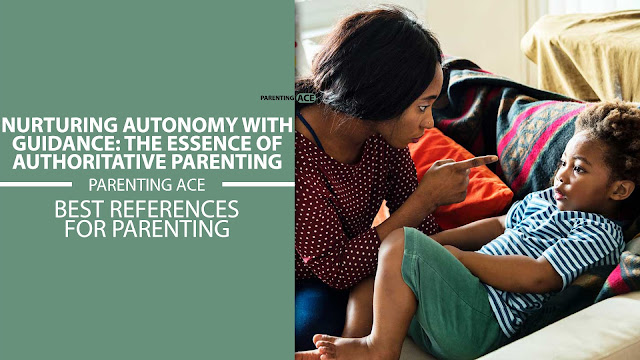Nurturing Autonomy with Guidance: The Essence of Authoritative Parenting
In the realm of parenting, striking a delicate balance between fostering independence and providing guidance is key to nurturing confident and resilient children. In our latest blog post, we delve into the essence of authoritative parenting, focusing on the concept of autonomy within this framework. By exploring the characteristics and benefits of autonomy with guidance, we uncover practical insights for parents seeking to cultivate an environment where children thrive while navigating the journey of self-discovery and growth. Join us as we embark on a journey to empower both parents and children alike in fostering autonomy with guidance, shaping a future generation of capable and self-assured individuals.
 |
| Nurturing Autonomy with Guidance: The Essence of Authoritative Parenting |
Parenting is a delicate balance between fostering independence and providing guidance. Among the various parenting styles identified by psychologists, authoritative parenting stands out for its emphasis on nurturing autonomy with guidance. This approach, characterized by warmth, responsiveness, and reasonable levels of control, plays a pivotal role in shaping children's development. In this article, we delve into the concept of autonomy within the framework of authoritative parenting, exploring its characteristics, benefits, and practical implications for raising confident and capable individuals.
Understanding Authoritative Parenting
Authoritative parenting is distinguished by its combination of high levels of warmth and responsiveness with clear expectations and boundaries. Unlike authoritarian parenting, which tends to be rigid and controlling, or permissive parenting, which lacks structure, authoritative parents offer support and encouragement while also setting reasonable limits. This balance allows children to develop a sense of autonomy within a supportive environment, fostering self-confidence and self-discipline.
Characteristics of Authoritative Parenting
- Clear Communication: Authoritative parents engage in open and honest communication with their children, actively listening to their perspectives and concerns. By encouraging dialogue and mutual respect, they lay the groundwork for collaborative decision-making and problem-solving.
- Setting Expectations: While authoritative parents provide warmth and support, they also establish clear expectations and boundaries. Children are aware of the family rules and understand the consequences of their actions, promoting a sense of accountability and responsibility.
- Encouraging Independence: Central to authoritative parenting is the belief in fostering independence while providing guidance. Parents encourage their children to explore new experiences, make choices, and learn from both successes and failures. This approach instills a sense of competence and resilience, empowering children to navigate challenges with confidence.
- Flexibility and Adaptability: Despite setting boundaries, authoritative parents remain flexible and responsive to their children's evolving needs and development. They recognize that effective parenting requires adjustments based on individual temperament, age, and circumstances, promoting a supportive and nurturing environment.
- Emotional Support: Authoritative parents offer emotional support and validation, nurturing their children's emotional well-being. By acknowledging and validating their feelings, children feel understood and valued, fostering secure attachments and healthy emotional development.
Benefits of Autonomy with Guidance
Nurturing autonomy within the framework of authoritative parenting yields numerous benefits for children's development:
- Enhanced self-esteem and self-confidence
- Improved decision-making skills and problem-solving abilities
- Greater resilience and adaptability in the face of challenges
- Stronger parent-child relationships based on trust and mutual respect
- Development of essential life skills, such as responsibility and self-discipline
Practical Implications for Parents
To incorporate autonomy with guidance into their parenting approach, parents can:
- Cultivate open communication channels and actively listen to their children's perspectives.
- Set clear and consistent expectations, reinforcing positive behaviors while addressing misbehavior constructively.
- Provide opportunities for children to make choices and take on age-appropriate responsibilities.
- Offer support and encouragement during times of challenge or adversity, promoting resilience and self-efficacy.
- Model respectful and empathetic behavior, demonstrating the values they wish to instill in their children.
Autonomy with guidance lies at the heart of authoritative parenting, offering a nurturing environment where children can thrive and develop into confident, capable individuals. By embracing the characteristics of authoritative parenting and fostering autonomy within supportive boundaries, parents play a crucial role in empowering their children to navigate life's challenges with resilience and self-assurance. As we continue to explore the intricacies of parenting, let us embrace the transformative power of autonomy with guidance in shaping the next generation.




